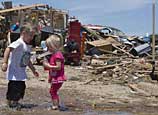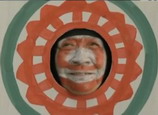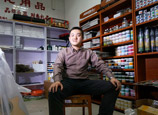
Lack of knowledge
A lack of scientific knowledge means most online conversations don't make any sense, according to Yang Shimeng, founder of China's most-popular bulletin boards about Mars One, and also Mars One Fans, an online chat group.
"But we can still learn from asking and answering questions - even though some of them are silly - especially when someone questions the feasibility of the project. It encourages people to use science to defend themselves," said Yang, a 24-year-old metallurgical engineer who has also applied for Mars One. "After all, there aren't many chances to talk about the Big Bang and space travel in our daily lives."
An artist's impression of a settlement on Mars. The Mars One project has attracted more than 78,000 applicants worldwide.
Living quarters inside the settlement, as envisaged by an artist.
An imagined vegetable garden inside the settlement.
An obsession with astronomy saw Yang devour popular science books in high school, including Stephen Hawking's A Brief History of Time, which helped him to come up with the idea that the universe resembles a huge soap bubble.
"If two soap bubbles collided, would they break or would they just become a larger bubble? Would one bubble have a smaller bubble inside it? These were the ideas whirring around my brain," he said.
Some of his teachers thought he was just wasting his time because the gaokao, China's national university entrance exam, would never include a question about bubbles.
In the end, the only bubble that burst was his dream of becoming an astronaut or a space scientist: "You have to be very competitive to get into those top universities and become a rocket scientist, I wasn't able to do that. Anyway, I've been shortsighted since third grade - have you ever seen an astronaut wearing eyeglasses?"


















 Post office demolished by 'mistake' overnight
Post office demolished by 'mistake' overnight


![]()
